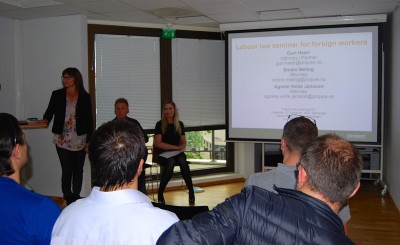Expatriates in Norway who come from countries outside the European Economic Area have the most to fear during the Corona crisis if they’re suddenly laid off from jobs that brought them to Norway. Even though Norwegian employers needed them because of special skills, and they’ve paid taxes like all other Norwegians, they won’t qualify for unemployment benefits and may have to pack up and travel home.

It’s a situation that’s come up in earlier crises, not least when many oil industry engineers and others hired from abroad were laid off when oil prices collapsed. Many must travel home, since their work- and residence permits are limited to a specific employer and they’re not legally able to qualify for other jobs outside their professions.
Welfare regulations require that benefits can only be paid out to those willing and able to take on other jobs offered to them. If their work permits limit them to a certain field or employers, state welfare agency NAV won’t help them since they’re not viewed as “real job seekers.”
Norwegian employers, not least in the oil industry, also have a tendency to lay off foreign workers before Norwegians. With unemployment rates very low in Norway before the Corona crisis hit, many Norwegian employers recruited help from abroad, not least in the revived oil industry and in the restaurant and tech branches. Now they’re the most vulnerable, and NRK reported they now number more than 12,600.
Labour movement on their side
Labour organizations that often view foreign workers unfavourably, for fear they’ll compete against Norwegians for jobs and accept lower pay, actually want to help those now faced with layoff and no benefits. NRK reported that labour officials are afraid they’ll otherwise wind up working in the black market, not least in the current situation when borders are closed and many foreign workers can’t travel home even if they wanted to.
“We’re worried about the consequences when they can’t demand benefits and can’t travel home either,” said Trude Tinnlund of Norway’s largest trade union confederation LO. Norway’s largest labour organization representing engineers and technology workers, NITO, is also concerned. “Many of these people were actively recruited when companies in Norway needed their competence,” NITO lawyer Farah Ali, told NRK. “The current regulations affect them in a very unreasonable manner.”
Both NITO and LO have taken the issue up with the government ministry in charge of labour and welfare issues. They argue that laid-off foreign professionals who meet fundamental conditions for income and residence in Norway should qualify for benefits during the period of their work- and residence permits.
Labour ministry ‘looking into the matter’
State secretary Vegard Einan in the Labour Ministry told NRK that efforts were underway to determine “whether there’s reason to ease some of these regulations on a temporary basis.” He acknowledged that foreign workers who get laid off wind up in “a situation where they have a good job, can’t work but must be able to quickly return to their job when the need arises.” Many employers don’t want to lose competent workers from abroad, but must lay them off temporarily in a crisis such as Corona.
Einan stressed, however, that there was “good reason” for the regulations to be as strict as they are. No one can just “come to Norway to work” (unless they’re from an EEA country), he noted. Professionals who lose their jobs or are temporarily laid off can remain in Norway as a job seeker in their professional sector for up to six months if their work permits remain valid. “After that, they just have to go home,” Einan told NRK.
It’s not that easy for people like Maria Florencia Becherini, age 43, who came to Norway from Argentina in 2012 and has been working as office manager in Tromsø for an organization that promotes Arctic cruising. She had special competence for the job but now fears losing it because of all the cruise cancellations.
“I have a mortgage and other fixed expenses, but I may not have a job soon,” Becherini told NRK. She won’t get benefits either, and feels forgotten by the government after paying taxes to Norway for eight years: “It feels terribly unfair.”
newsinenglish.no/Nina Berglund

